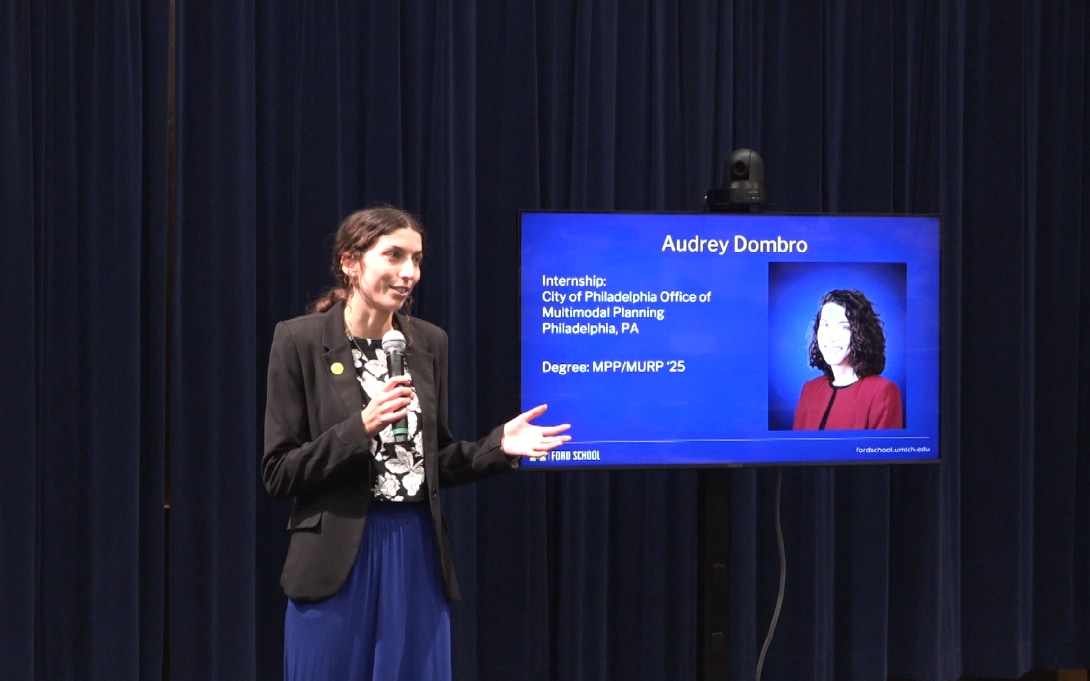
Eleven talented students showcased what they learned during their summer internship at the Ford School 7th Annual Policy Pitch Competition. Undergraduate and graduate students spent three minutes sharing their key deliverables, policy impacts, and lessons learned with the chance to compete for 1st, 2nd, and 3rd student prizes.
The panel of judges awarded students based on the clarity and effectiveness of the presentation, the potential policy impact of their work, and how it influenced the student’s long-term goals. Judges included: Yousef Rabhi, Washtenaw County Commissioner, Rohan Dharan (BA’13), Manager of Secondary Advanced and Enriched Instruction at District of Columbia Public Schools, and Latesha Love-Grayer (MPP’02), Director of International Affairs and Trade at US Government Accountability Office.
Audrey Dombro (MPP/MURP ‘25) – City of Philadelphia, Office of Transportation and Infrastructure Systems
Sometimes we are going to encounter policies that don't fit the world around us. Take transportation policy.
As the automobile became the dominant mode of American transportation in the 20th century, our streets were plagued with traffic crashes. Then in came a slew of policies to increase safety. Now some worked, mandating installation of seat belts is estimated to have saved 400,000 lives.
Other policies, though, have made streets more efficient for car traffic, but death traps for people outside a vehicle.
I learned about speed management in Philadelphia this summer, while working with the city's office of multimodal planning on the Vision 0 Initiative to eradicate traffic deaths and serious injuries.
I crunched the numbers and found that, in Philadelphia, people walking, rolling and bicycling are only involved in 8% of traffic crashes, but represent 43% of deaths.
When a crash occurs, there is one overwhelming determinant of whether a pedestrian will survive: Speed.
When hit by a driver traveling at 20 miles per hour, the risk of death for a pedestrian is less than 10%, but at speeds over 40 miles per hour, the risk of death for a pedestrian increases to 90%.
So how we manage speed actually reveals a lot about our underlying values.
You might be wondering about the complicated formulas that policymakers use to set the ideal speed limit. Well, it's not really policymakers who set speed limits, it's drivers.
In Philadelphia and cities across America, the speed limit is set, based on how quickly drivers naturally travel on a street. It's called the 85th percentile speed, meaning that the speed limit is set so that 85% of traffic is traveling at or under that speed.
This summer in Philadelphia we hosted a speed management workshop to explore how we could prioritize human life over efficiency on our streets. For inspiration, we invited New Zealanders who had innovated an entirely new speed management policy on their streets.
We started with a question: What speed should drivers travel at on a street in our civic center? Our neighborhoods? A commercial district? Then, how do we get there?
Setting speed limits to account for the safety of people outside a vehicle establishes an expectation for drivers.
But when I analyzed speeds on 3 Philadelphia streets before and after a pilot program reduced speed limits, I found that we have to do more to ensure drivers comply.
So I wrote a memo advocating for design improvements, like protected bicycle lanes and elevated crosswalks to work together with speed limits to make streets safer and slow drivers down.
Sometimes we have to revisit yesterday's policies in order to create a better tomorrow, and we might just find that slowing down will get us there faster.
Thank you.
Read the other pitches:
Georgina Bailey – Lansing Board of Water & Light
Bridget Corwin – Great Lakes Renewable Energy Association
Audrey Dombro – City of Philadelphia, Office of Transportation and Infrastructure Systems
Nia Knox – UM Poverty Solutions
Emily Kuttner – City of Chicago, Mayor's Office
Alexie Milukhin – The Institute for College Access and Success (TICAS)
Samuel Owusu – U.S. House of Representatives, Committee on Education & the Workforce
Aiswarya Padmanabhan – Trust for Social Achievement
Katrina Wheelan – City of Detroit, Office of Budget